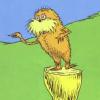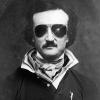-
Posts
80 -
Joined
-
Last visited
Reputation Activity
-
 chaucerettescs got a reaction from ArthChauc in Books NOT to read-
chaucerettescs got a reaction from ArthChauc in Books NOT to read-
We'll have to agree to disagree on what defines "literary" merit, as I found the lectures and discussions on each of the bullets in that list to have plenty of both intellectual and literary merit.
The literary merit of the series admittedly isn't found in Rowling's prose (which is not stellar, but is not as bad as everyone seems determined to make it out to be), but in the series' themes, characters, and the maturity with which the series (especially from Book 3 onwards) handles topics like war, personal autonomy, and racism.
It has literary merit in that both expands on and plays with tropes, imagery, and themes from Dickens, Carroll, and centuries of folklore. Rowling may not have fabulous prose, but she isn't a bad storyteller. She knows her folklore, she knows her children's lit, she understands fantasy. She understands form. Does she make mistakes? Holy shit, yes, and those failings are worth discussion, too, if not more so.
The series has literary merit in that it doesn't talk down to it's young audience, which is something that is far too frequent in a lot of children's literature and YA since the 1980s. It has literary merit in that it has ignited many discussions about both the censorship of literature and the representation of women, the LGBT community, and disabled community in popular fiction, something that does tie into the form and language of the work, not just its characterizations, as something as subtle as poor word choice can easily make positive representations fall apart.
I don't separate any of this from the series' literary merit and am puzzled about where you're drawing the line between literary merit and value. Is it form? Because I don't see how many of the things I mentioned in my list aren't inextricably linked to form.
It's a 4100 page series. You read 100 pages. That's less than a third of the first book and less than 2.5% of the full series. You are certainly entitled to your opinion if you didn't like those 100 pages, but that doesn't mean the series is without literary merit.
I'm not trying to be snarky, but this distinction between value and merit bewilders the hell out of me.
-
 chaucerettescs got a reaction from ArthChauc in Books NOT to read-
chaucerettescs got a reaction from ArthChauc in Books NOT to read-
To throw my two cents into the ring, when we studied Harry Potter and the Prisoner of Azkaban at Michigan, we explored and/or deconstucted:
- the trope of the Boy Hero
- the duality of good and evil
- the banality of evil
- Neo-Medievalism and Neo-Victorianism
- Dickensian influence on Rowling's work
- parallels to true life examples of genocide and racial hatred
- questions about children's autonomy
- questions about what defines humanity and monstrosity
- the dangers of inefficient bureaucracy
- the dangers of a Draconian and biased justice system
- the dangers inherent in believing everything you read/everything adults tell you
- the dangers inherent in keeping children uninformed in order to protect them
- The Sorting and tribalism
- the nature of forgiveness
- gender
- queer narratives
- disability narratives and ableist prejudice (Remus Lupin)
- child soldier narratives
- animal symbolism
- Jungian archetypes
- Biblical symbolism
- censorship, both within the world of text itself and the real-life drama surrounding the publication of Rowling's work
- the reemergence of children's lit and YA as a powerful commercial force
- adaptation and simulacrum
- the history of children's publishing since the Edwardian period
I can go on and on and on and that was only for one book out of a series of seven. At this point I'm convinced that if you find nothing worth discussing when it comes to Harry Potter, you either have only seen the films (or just trailers for the films) or you're being the worst kind of canonical fanatic or both.
Also, it's worth noting that when we studied Potter, everyone in the class had read it before. Everyone. In fact, during many of my classes at Michigan, Potter was often used as a touchstone to better explain themes and theories because, again, 9 out of every 10 students had read it. Explain to me how exploring the themes of one of the most widespread literary phenomena ever is not worthwhile or at least of some interest to us folks who plan on studying literature for a living.
Stop assuming everything popular is inferior. Stop assuming works written for younger audiences are inferior. You want to bash Twilight? Fine. But don't do it because it's a YA novel. Do it because it's an irredeemably bad YA novel.
-
 chaucerettescs got a reaction from bennoarchimboldi in Books NOT to read-
chaucerettescs got a reaction from bennoarchimboldi in Books NOT to read-
To throw my two cents into the ring, when we studied Harry Potter and the Prisoner of Azkaban at Michigan, we explored and/or deconstucted:
- the trope of the Boy Hero
- the duality of good and evil
- the banality of evil
- Neo-Medievalism and Neo-Victorianism
- Dickensian influence on Rowling's work
- parallels to true life examples of genocide and racial hatred
- questions about children's autonomy
- questions about what defines humanity and monstrosity
- the dangers of inefficient bureaucracy
- the dangers of a Draconian and biased justice system
- the dangers inherent in believing everything you read/everything adults tell you
- the dangers inherent in keeping children uninformed in order to protect them
- The Sorting and tribalism
- the nature of forgiveness
- gender
- queer narratives
- disability narratives and ableist prejudice (Remus Lupin)
- child soldier narratives
- animal symbolism
- Jungian archetypes
- Biblical symbolism
- censorship, both within the world of text itself and the real-life drama surrounding the publication of Rowling's work
- the reemergence of children's lit and YA as a powerful commercial force
- adaptation and simulacrum
- the history of children's publishing since the Edwardian period
I can go on and on and on and that was only for one book out of a series of seven. At this point I'm convinced that if you find nothing worth discussing when it comes to Harry Potter, you either have only seen the films (or just trailers for the films) or you're being the worst kind of canonical fanatic or both.
Also, it's worth noting that when we studied Potter, everyone in the class had read it before. Everyone. In fact, during many of my classes at Michigan, Potter was often used as a touchstone to better explain themes and theories because, again, 9 out of every 10 students had read it. Explain to me how exploring the themes of one of the most widespread literary phenomena ever is not worthwhile or at least of some interest to us folks who plan on studying literature for a living.
Stop assuming everything popular is inferior. Stop assuming works written for younger audiences are inferior. You want to bash Twilight? Fine. But don't do it because it's a YA novel. Do it because it's an irredeemably bad YA novel.
-
 chaucerettescs got a reaction from Fiz in Books NOT to read-
chaucerettescs got a reaction from Fiz in Books NOT to read-
To throw my two cents into the ring, when we studied Harry Potter and the Prisoner of Azkaban at Michigan, we explored and/or deconstucted:
- the trope of the Boy Hero
- the duality of good and evil
- the banality of evil
- Neo-Medievalism and Neo-Victorianism
- Dickensian influence on Rowling's work
- parallels to true life examples of genocide and racial hatred
- questions about children's autonomy
- questions about what defines humanity and monstrosity
- the dangers of inefficient bureaucracy
- the dangers of a Draconian and biased justice system
- the dangers inherent in believing everything you read/everything adults tell you
- the dangers inherent in keeping children uninformed in order to protect them
- The Sorting and tribalism
- the nature of forgiveness
- gender
- queer narratives
- disability narratives and ableist prejudice (Remus Lupin)
- child soldier narratives
- animal symbolism
- Jungian archetypes
- Biblical symbolism
- censorship, both within the world of text itself and the real-life drama surrounding the publication of Rowling's work
- the reemergence of children's lit and YA as a powerful commercial force
- adaptation and simulacrum
- the history of children's publishing since the Edwardian period
I can go on and on and on and that was only for one book out of a series of seven. At this point I'm convinced that if you find nothing worth discussing when it comes to Harry Potter, you either have only seen the films (or just trailers for the films) or you're being the worst kind of canonical fanatic or both.
Also, it's worth noting that when we studied Potter, everyone in the class had read it before. Everyone. In fact, during many of my classes at Michigan, Potter was often used as a touchstone to better explain themes and theories because, again, 9 out of every 10 students had read it. Explain to me how exploring the themes of one of the most widespread literary phenomena ever is not worthwhile or at least of some interest to us folks who plan on studying literature for a living.
Stop assuming everything popular is inferior. Stop assuming works written for younger audiences are inferior. You want to bash Twilight? Fine. But don't do it because it's a YA novel. Do it because it's an irredeemably bad YA novel.
-
 chaucerettescs got a reaction from toasterazzi in Books NOT to read-
chaucerettescs got a reaction from toasterazzi in Books NOT to read-
I think that's a solid perspective, it just isn't one I subscribe to. Form and prose matter, but, to me, they are not all that matter and certainly not the ultimate gauge of literary merit.
Yes, the ideas in the books could have been presented in another form, but they weren't. They were presented in a novel. Rowling chose to present them to a broad audience (and to a young audience) in the form of fiction and that choice makes
Novels are used as vehicles for ideas and to discuss the Novel while stripping it of that function is strange to me, especially when novels are one of the most effective means of delivering ideas because of the exercise in empathy that they present to the reader. To me, a discussion of literature is not complete without taking all of literature's functions into consideration. Transmission of ideas is still one of the main reasons why writers write and readers read and is, to me, every bit as important as form and art for the sake of itself.
"IMO specifically literary merit, value and interest lies in the way a writer uses words and raises ideas in a way that simultaneously explores and questions the possibility of the form of writing itself."
See, but, to me, Rowling does do this. She loves playing with the limitations of the form. One of the most obvious examples I can think of her choice to stick with a single third person perspective (Harry) throughout nearly the entire duration of a series filled with hundreds of characters. The limitations of Harry's perspective (and thus our perspective as readers) work to her advantage when it comes to plotting, but, more importantly, play a major role in the text and often serve to reinforce many of themes threaded through the series. Example: one of the messages in the series that I noted above is "the are dangers inherent in keeping children ignorant in order to protect them". Many adults in the series lie to Harry and/or keep him uninformed of the danger unfolding around him in order to protect him. Because we, the reader, know only what Harry knows, we are also kept in the dark. When Harry's ignorance has disastrous consequences, it's a gut punch for the reader because chances are we, given our limited perspective, have jumped to many of the same conclusions that Harry has. We make the same mistakes. When Harry realizes he's been lied to, the reader feels equally betrayed because we have also been lied to - not just by the characters, but by the form of the novel itself. The limited third person perspective gives the message about lying to children much more impact because it provokes an emotional response out of us. It makes us live through that injustice and hypocrisy ourselves, even if only in a small way. The same applies for many of the other themes of the work. The way the series handles prejudice is especially tied up in the limited perspective. The series deals with prejudice both explicitly and implicitly. We see the world through Harry's sometimes prejudiced perspective and, more often than not, discover in the end that he was wrong, forcing the reader to 1) face up to their own prejudices and expectations (because, again, readers often finds themselves siding with Harry), 2) points out the insufficiency of any one single perspective on any situation, which 3) points out the limitations of a single perspective in a work of fiction, and 4) reinforces the series' explicit messages about prejudice. And when you take into consideration that one of the most major themes of the work is the encouragement of children's skepticism, the fact that characters/the text regularly withhold crucial information from Harry/the reader only to reveal it later is pretty damn smart. If Rowling had chosen an omniscient narrator or alternating POVs, not only would the structure of the series be very different, but many of its themes would not be as impactful. Rowling choice of a limited third person POV is ostensibly a simple one, but it is a literary one. And I could literally rant and ramble about all the ways form and content do mesh in these books, but that's just going to end up being unpleasant for everyone involved because I just.have.so.many.feelings. -
 chaucerettescs got a reaction from Imaginary in Books NOT to read-
chaucerettescs got a reaction from Imaginary in Books NOT to read-
Whoops, part of that entry got deleted. Don't know why GC won't let me edit.
Meant to say: "Rowling chose to present them [her ideas] to a broad audience (and to a young audience) in the form of fiction and that choice to use the form of fiction as a vehicle for her ideas automatically makes this matter a literary one for me. The conscious decision to convey ideas through fiction is always a literary decision."
-
 chaucerettescs got a reaction from Kamisha in Books NOT to read-
chaucerettescs got a reaction from Kamisha in Books NOT to read-
To throw my two cents into the ring, when we studied Harry Potter and the Prisoner of Azkaban at Michigan, we explored and/or deconstucted:
- the trope of the Boy Hero
- the duality of good and evil
- the banality of evil
- Neo-Medievalism and Neo-Victorianism
- Dickensian influence on Rowling's work
- parallels to true life examples of genocide and racial hatred
- questions about children's autonomy
- questions about what defines humanity and monstrosity
- the dangers of inefficient bureaucracy
- the dangers of a Draconian and biased justice system
- the dangers inherent in believing everything you read/everything adults tell you
- the dangers inherent in keeping children uninformed in order to protect them
- The Sorting and tribalism
- the nature of forgiveness
- gender
- queer narratives
- disability narratives and ableist prejudice (Remus Lupin)
- child soldier narratives
- animal symbolism
- Jungian archetypes
- Biblical symbolism
- censorship, both within the world of text itself and the real-life drama surrounding the publication of Rowling's work
- the reemergence of children's lit and YA as a powerful commercial force
- adaptation and simulacrum
- the history of children's publishing since the Edwardian period
I can go on and on and on and that was only for one book out of a series of seven. At this point I'm convinced that if you find nothing worth discussing when it comes to Harry Potter, you either have only seen the films (or just trailers for the films) or you're being the worst kind of canonical fanatic or both.
Also, it's worth noting that when we studied Potter, everyone in the class had read it before. Everyone. In fact, during many of my classes at Michigan, Potter was often used as a touchstone to better explain themes and theories because, again, 9 out of every 10 students had read it. Explain to me how exploring the themes of one of the most widespread literary phenomena ever is not worthwhile or at least of some interest to us folks who plan on studying literature for a living.
Stop assuming everything popular is inferior. Stop assuming works written for younger audiences are inferior. You want to bash Twilight? Fine. But don't do it because it's a YA novel. Do it because it's an irredeemably bad YA novel.
-
 chaucerettescs got a reaction from ProfLorax in Books NOT to read-
chaucerettescs got a reaction from ProfLorax in Books NOT to read-
To throw my two cents into the ring, when we studied Harry Potter and the Prisoner of Azkaban at Michigan, we explored and/or deconstucted:
- the trope of the Boy Hero
- the duality of good and evil
- the banality of evil
- Neo-Medievalism and Neo-Victorianism
- Dickensian influence on Rowling's work
- parallels to true life examples of genocide and racial hatred
- questions about children's autonomy
- questions about what defines humanity and monstrosity
- the dangers of inefficient bureaucracy
- the dangers of a Draconian and biased justice system
- the dangers inherent in believing everything you read/everything adults tell you
- the dangers inherent in keeping children uninformed in order to protect them
- The Sorting and tribalism
- the nature of forgiveness
- gender
- queer narratives
- disability narratives and ableist prejudice (Remus Lupin)
- child soldier narratives
- animal symbolism
- Jungian archetypes
- Biblical symbolism
- censorship, both within the world of text itself and the real-life drama surrounding the publication of Rowling's work
- the reemergence of children's lit and YA as a powerful commercial force
- adaptation and simulacrum
- the history of children's publishing since the Edwardian period
I can go on and on and on and that was only for one book out of a series of seven. At this point I'm convinced that if you find nothing worth discussing when it comes to Harry Potter, you either have only seen the films (or just trailers for the films) or you're being the worst kind of canonical fanatic or both.
Also, it's worth noting that when we studied Potter, everyone in the class had read it before. Everyone. In fact, during many of my classes at Michigan, Potter was often used as a touchstone to better explain themes and theories because, again, 9 out of every 10 students had read it. Explain to me how exploring the themes of one of the most widespread literary phenomena ever is not worthwhile or at least of some interest to us folks who plan on studying literature for a living.
Stop assuming everything popular is inferior. Stop assuming works written for younger audiences are inferior. You want to bash Twilight? Fine. But don't do it because it's a YA novel. Do it because it's an irredeemably bad YA novel.
-
 chaucerettescs got a reaction from toasterazzi in Books NOT to read-
chaucerettescs got a reaction from toasterazzi in Books NOT to read-
To throw my two cents into the ring, when we studied Harry Potter and the Prisoner of Azkaban at Michigan, we explored and/or deconstucted:
- the trope of the Boy Hero
- the duality of good and evil
- the banality of evil
- Neo-Medievalism and Neo-Victorianism
- Dickensian influence on Rowling's work
- parallels to true life examples of genocide and racial hatred
- questions about children's autonomy
- questions about what defines humanity and monstrosity
- the dangers of inefficient bureaucracy
- the dangers of a Draconian and biased justice system
- the dangers inherent in believing everything you read/everything adults tell you
- the dangers inherent in keeping children uninformed in order to protect them
- The Sorting and tribalism
- the nature of forgiveness
- gender
- queer narratives
- disability narratives and ableist prejudice (Remus Lupin)
- child soldier narratives
- animal symbolism
- Jungian archetypes
- Biblical symbolism
- censorship, both within the world of text itself and the real-life drama surrounding the publication of Rowling's work
- the reemergence of children's lit and YA as a powerful commercial force
- adaptation and simulacrum
- the history of children's publishing since the Edwardian period
I can go on and on and on and that was only for one book out of a series of seven. At this point I'm convinced that if you find nothing worth discussing when it comes to Harry Potter, you either have only seen the films (or just trailers for the films) or you're being the worst kind of canonical fanatic or both.
Also, it's worth noting that when we studied Potter, everyone in the class had read it before. Everyone. In fact, during many of my classes at Michigan, Potter was often used as a touchstone to better explain themes and theories because, again, 9 out of every 10 students had read it. Explain to me how exploring the themes of one of the most widespread literary phenomena ever is not worthwhile or at least of some interest to us folks who plan on studying literature for a living.
Stop assuming everything popular is inferior. Stop assuming works written for younger audiences are inferior. You want to bash Twilight? Fine. But don't do it because it's a YA novel. Do it because it's an irredeemably bad YA novel.
-
 chaucerettescs got a reaction from Basiamille in Books NOT to read-
chaucerettescs got a reaction from Basiamille in Books NOT to read-
To throw my two cents into the ring, when we studied Harry Potter and the Prisoner of Azkaban at Michigan, we explored and/or deconstucted:
- the trope of the Boy Hero
- the duality of good and evil
- the banality of evil
- Neo-Medievalism and Neo-Victorianism
- Dickensian influence on Rowling's work
- parallels to true life examples of genocide and racial hatred
- questions about children's autonomy
- questions about what defines humanity and monstrosity
- the dangers of inefficient bureaucracy
- the dangers of a Draconian and biased justice system
- the dangers inherent in believing everything you read/everything adults tell you
- the dangers inherent in keeping children uninformed in order to protect them
- The Sorting and tribalism
- the nature of forgiveness
- gender
- queer narratives
- disability narratives and ableist prejudice (Remus Lupin)
- child soldier narratives
- animal symbolism
- Jungian archetypes
- Biblical symbolism
- censorship, both within the world of text itself and the real-life drama surrounding the publication of Rowling's work
- the reemergence of children's lit and YA as a powerful commercial force
- adaptation and simulacrum
- the history of children's publishing since the Edwardian period
I can go on and on and on and that was only for one book out of a series of seven. At this point I'm convinced that if you find nothing worth discussing when it comes to Harry Potter, you either have only seen the films (or just trailers for the films) or you're being the worst kind of canonical fanatic or both.
Also, it's worth noting that when we studied Potter, everyone in the class had read it before. Everyone. In fact, during many of my classes at Michigan, Potter was often used as a touchstone to better explain themes and theories because, again, 9 out of every 10 students had read it. Explain to me how exploring the themes of one of the most widespread literary phenomena ever is not worthwhile or at least of some interest to us folks who plan on studying literature for a living.
Stop assuming everything popular is inferior. Stop assuming works written for younger audiences are inferior. You want to bash Twilight? Fine. But don't do it because it's a YA novel. Do it because it's an irredeemably bad YA novel.
-
 chaucerettescs got a reaction from iExcelAtMicrosoftPuns in Books NOT to read-
chaucerettescs got a reaction from iExcelAtMicrosoftPuns in Books NOT to read-
To throw my two cents into the ring, when we studied Harry Potter and the Prisoner of Azkaban at Michigan, we explored and/or deconstucted:
- the trope of the Boy Hero
- the duality of good and evil
- the banality of evil
- Neo-Medievalism and Neo-Victorianism
- Dickensian influence on Rowling's work
- parallels to true life examples of genocide and racial hatred
- questions about children's autonomy
- questions about what defines humanity and monstrosity
- the dangers of inefficient bureaucracy
- the dangers of a Draconian and biased justice system
- the dangers inherent in believing everything you read/everything adults tell you
- the dangers inherent in keeping children uninformed in order to protect them
- The Sorting and tribalism
- the nature of forgiveness
- gender
- queer narratives
- disability narratives and ableist prejudice (Remus Lupin)
- child soldier narratives
- animal symbolism
- Jungian archetypes
- Biblical symbolism
- censorship, both within the world of text itself and the real-life drama surrounding the publication of Rowling's work
- the reemergence of children's lit and YA as a powerful commercial force
- adaptation and simulacrum
- the history of children's publishing since the Edwardian period
I can go on and on and on and that was only for one book out of a series of seven. At this point I'm convinced that if you find nothing worth discussing when it comes to Harry Potter, you either have only seen the films (or just trailers for the films) or you're being the worst kind of canonical fanatic or both.
Also, it's worth noting that when we studied Potter, everyone in the class had read it before. Everyone. In fact, during many of my classes at Michigan, Potter was often used as a touchstone to better explain themes and theories because, again, 9 out of every 10 students had read it. Explain to me how exploring the themes of one of the most widespread literary phenomena ever is not worthwhile or at least of some interest to us folks who plan on studying literature for a living.
Stop assuming everything popular is inferior. Stop assuming works written for younger audiences are inferior. You want to bash Twilight? Fine. But don't do it because it's a YA novel. Do it because it's an irredeemably bad YA novel.
-
 chaucerettescs got a reaction from shortstack51 in Books NOT to read-
chaucerettescs got a reaction from shortstack51 in Books NOT to read-
To throw my two cents into the ring, when we studied Harry Potter and the Prisoner of Azkaban at Michigan, we explored and/or deconstucted:
- the trope of the Boy Hero
- the duality of good and evil
- the banality of evil
- Neo-Medievalism and Neo-Victorianism
- Dickensian influence on Rowling's work
- parallels to true life examples of genocide and racial hatred
- questions about children's autonomy
- questions about what defines humanity and monstrosity
- the dangers of inefficient bureaucracy
- the dangers of a Draconian and biased justice system
- the dangers inherent in believing everything you read/everything adults tell you
- the dangers inherent in keeping children uninformed in order to protect them
- The Sorting and tribalism
- the nature of forgiveness
- gender
- queer narratives
- disability narratives and ableist prejudice (Remus Lupin)
- child soldier narratives
- animal symbolism
- Jungian archetypes
- Biblical symbolism
- censorship, both within the world of text itself and the real-life drama surrounding the publication of Rowling's work
- the reemergence of children's lit and YA as a powerful commercial force
- adaptation and simulacrum
- the history of children's publishing since the Edwardian period
I can go on and on and on and that was only for one book out of a series of seven. At this point I'm convinced that if you find nothing worth discussing when it comes to Harry Potter, you either have only seen the films (or just trailers for the films) or you're being the worst kind of canonical fanatic or both.
Also, it's worth noting that when we studied Potter, everyone in the class had read it before. Everyone. In fact, during many of my classes at Michigan, Potter was often used as a touchstone to better explain themes and theories because, again, 9 out of every 10 students had read it. Explain to me how exploring the themes of one of the most widespread literary phenomena ever is not worthwhile or at least of some interest to us folks who plan on studying literature for a living.
Stop assuming everything popular is inferior. Stop assuming works written for younger audiences are inferior. You want to bash Twilight? Fine. But don't do it because it's a YA novel. Do it because it's an irredeemably bad YA novel.
-
 chaucerettescs reacted to bgguitarist in Fall 2014 applicants??
chaucerettescs reacted to bgguitarist in Fall 2014 applicants??
I'm accepted at U Florida! Just got off the phone with the DGS. They are only taking 9 applicants this year, and have over 200 applications. Funding is fairly dismal. They won't pay for me to visit. But, I am eligible for the Kirkland Fellowship because I'm a Victorianist, so that would make a large difference in the funding.
Moments later, I checked my email and discovered I'd been rejected by U Chicago. They didn't offer me an M.A. but I already have one.
-
 chaucerettescs reacted to It's (Not) About Me in 0% Confidence of Acceptance
chaucerettescs reacted to It's (Not) About Me in 0% Confidence of Acceptance
But... but... EVERYONE, QUIET! I got something to say!
-

-

-
 chaucerettescs reacted to practical cat in Fall 2013 English Lit Applicants
chaucerettescs reacted to practical cat in Fall 2013 English Lit Applicants
But seriously though. Has anyone claimed that Penn phone call from last night? We want to bother you...
-
 chaucerettescs got a reaction from FlamingoLingo in Haven't heard from... well, lots of places
chaucerettescs got a reaction from FlamingoLingo in Haven't heard from... well, lots of places
Oh, yeah, if I do this again this Winter, I am casting a massive net. A net the likes of which even Finnick Odair has never seen!
-
 chaucerettescs got a reaction from Stingermania in What are you reading?
chaucerettescs got a reaction from Stingermania in What are you reading?
Haha, well, hello there! I'm hoping to reread A Storm of Swords before Season 3 of Game of Thrones starts up.
-
 chaucerettescs got a reaction from thatjewishgirl in 0% Confidence of Acceptance
chaucerettescs got a reaction from thatjewishgirl in 0% Confidence of Acceptance
Sort of. I was raised in a predominantly Jewish neighborhood in south Florida and so grew up surrounded by Jewish culture. It wasn't until I moved to Michigan that things got a little weird. I use so much Yiddish slang in my casual lexicon that when I got to Michigan everyone here was convinced that I was Jewish, which was strange to me because it had never really occurred to me until then that so many of those words aren't just every day parlance for most people. And then when I became so defensive of Shylock in my Shakespeare courses people were absolutely positive I had to be Jewish. When I told them I wasn't, people got kind of funny about it. They just couldn't understand why I cared so much if I wasn't actually Jewish myself (the answer "I don't like seeing people be dehumanized" apparently wasn't obvious).
And when we did Daniel Deronda in Victorian lit... forget about it. Granted, pretty much everyone in that class loved Daniel, but, yeah, people weren't all that interested in the "Jewish part" which really bummed me out because that was all I wanted to talk about. I dunno, it's probably because of how and where I grew up, but representations of Judaism touches a sensitive spot in me... which is really hard to explain without sounding like a complete ass. People tend to think I mean "I GREW UP IN A JEWISH NEIGHBORHOOD THEREFORE IT'S LIKE I ~AM~ JEWISH" which is really, really not what I mean (I was not raised Jewish, the Jewish religion and Jewish history are not my own, I have never experienced anti-Semitism, and so I would not dare presume to even suggest something so ridiculous). It's just that when most of your neighbors, friends, and parents' friends are part of a culture different than your own, it leaves an impression on your life and your interests.
tl;dr
It's funny, I actually didn't mention this interest in my SOP (I already had way too many interests shoved in there and it was beginning to look a bit scattered), but I just realized that an adcomm would know it from reading my CV because I did a guest lecture on Elizabethan anti-Semitism a few years back at a community college. Which, good, I'd like them to know, but now I'm wondering if it looks a bit funny having a guest lecture on the Elizabethan period when I'm a Victorian concentrator.
Is anyone else's CV a bit jumbled when it comes to your declared interests (you're a Victorian concentrator, but you have a guest lecture on an Elizabethan topic or an essay published about American modernism, etc)? How much of the talking should you let your CV do as far as your interests go? Example: Would it be wise not to strongly emphasize my interests in children's lit and speculative fiction in my next round of SOPs and then just let the work I've done which is listed on my CV imply those interests? -
 chaucerettescs got a reaction from 1Q84 in 0% Confidence of Acceptance
chaucerettescs got a reaction from 1Q84 in 0% Confidence of Acceptance
Lol, ok, that's madness. Even really traditional scholars who don't give much thought to children's literature consider Lewis Carroll "serious" literature. Eric Rabkin, the fantasy/sci-fi prof here at Michigan, does entire units on Alice and would probably teach whole courses on Carroll if he could.
See, this is where I get frustrated. I haven't any problem with traditional scholarship (I like most of it and a lot of my work could be considered traditional), but I get pretty peeved when people don't consider children's literature worth the same amount of analysis as adult literature. As though because it's for children, it must be fluff. How is William Blake or Christina Rossetti or Lewis Carroll or Charles Dickens or J.M. Barrie fluff? Shenanigans, I say!
-
 chaucerettescs got a reaction from InHacSpeVivo in 0% Confidence of Acceptance
chaucerettescs got a reaction from InHacSpeVivo in 0% Confidence of Acceptance
Lol, ok, that's madness. Even really traditional scholars who don't give much thought to children's literature consider Lewis Carroll "serious" literature. Eric Rabkin, the fantasy/sci-fi prof here at Michigan, does entire units on Alice and would probably teach whole courses on Carroll if he could.
See, this is where I get frustrated. I haven't any problem with traditional scholarship (I like most of it and a lot of my work could be considered traditional), but I get pretty peeved when people don't consider children's literature worth the same amount of analysis as adult literature. As though because it's for children, it must be fluff. How is William Blake or Christina Rossetti or Lewis Carroll or Charles Dickens or J.M. Barrie fluff? Shenanigans, I say!
-
 chaucerettescs got a reaction from stratofanatic in What are you reading?
chaucerettescs got a reaction from stratofanatic in What are you reading?
I never emerge from Harry Potter world. I live here full time.
One of my favorite tumblr posts ever was a simple text post explaining how the poster doesn't reblog Harry Potter stuff much because "blogging about Harry Potter is like blogging about having feet" </truth>
-
 chaucerettescs reacted to Tybalt in 0% Confidence of Acceptance
chaucerettescs reacted to Tybalt in 0% Confidence of Acceptance
I have nothing to add to this, but you mentioned a couple of Victorian writers and used the word "shenanigans" so I felt compelled to post the following:
-
 chaucerettescs got a reaction from InHacSpeVivo in 0% Confidence of Acceptance
chaucerettescs got a reaction from InHacSpeVivo in 0% Confidence of Acceptance
I'm sorry your prof wasn't much help, but I'm curious now, too. What did you write about? Because the "serious" literature claim is really lame on your professor's part. Scholars have written theses on Harry Potter and as for Twilight (bluh), every time I check listings of call-for-papers and upcoming conferences lately there is tons of stuff for "supernatural romance" and "urban fantasy". Heck, even rom-zom-coms. Understanding popular literature (why it's popular, what its influences are, questions about fandom) is just as important as understanding older, more "serious" literature. A good scholar can write a good paper on just about anything.
However, I do agree with Magical Realist that if your application is stressing a, shall we say, "genre studies" angle— if your writing sample was about popular fiction or even "bad" fiction— you need to be mindful of where you're applying because not every school has the resources for or interest in that kind of research. And then there's just the frustration of knowing that even if you do your research and find good fits, there is still a chance of being rejected. All the schools I shot for are Top 20, but, with the exception of Cornell, all had POIs and other resources for my sub-concentrations (children's lit, fantasy, science fiction etc.). That hasn't kept me from being rejected pretty much across the board.
It's kind of horrible, but if I really am down and out, I'm wondering if I should downplay my interest in genre studies on my apps next cycle. I'm really curious about how much it hurts/helps/dooms(?) you, even at schools that do do that kind of work.












